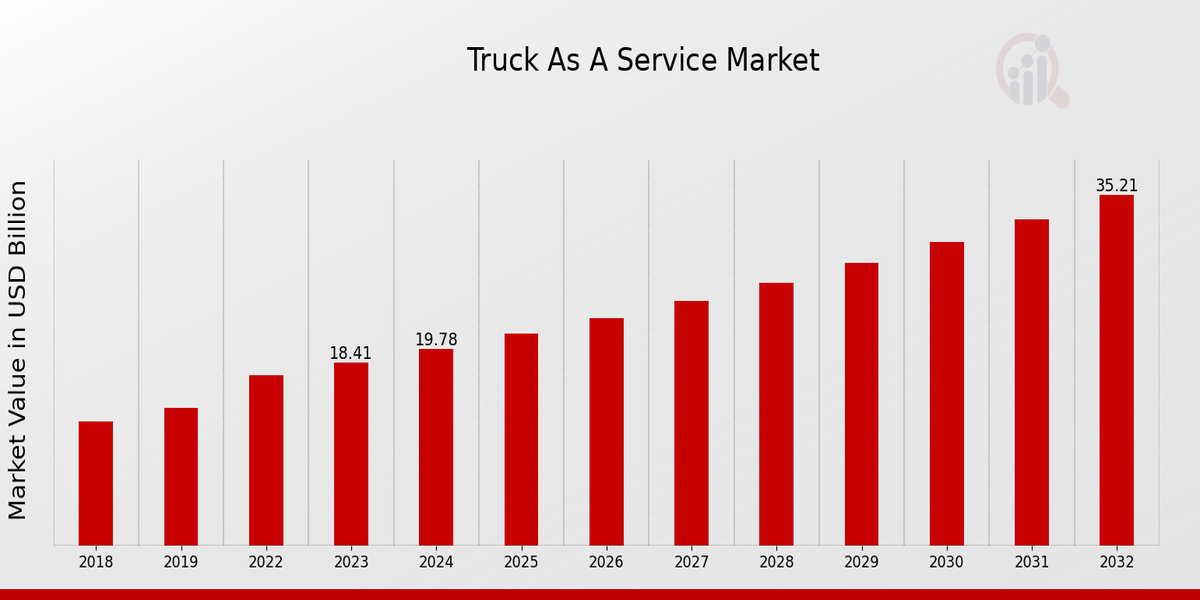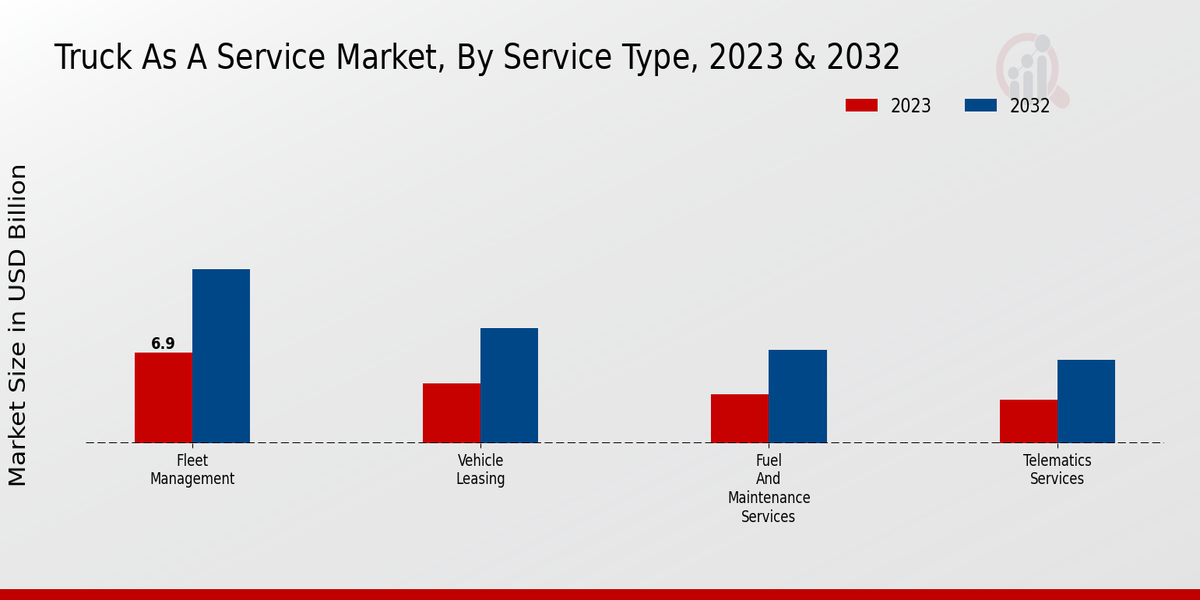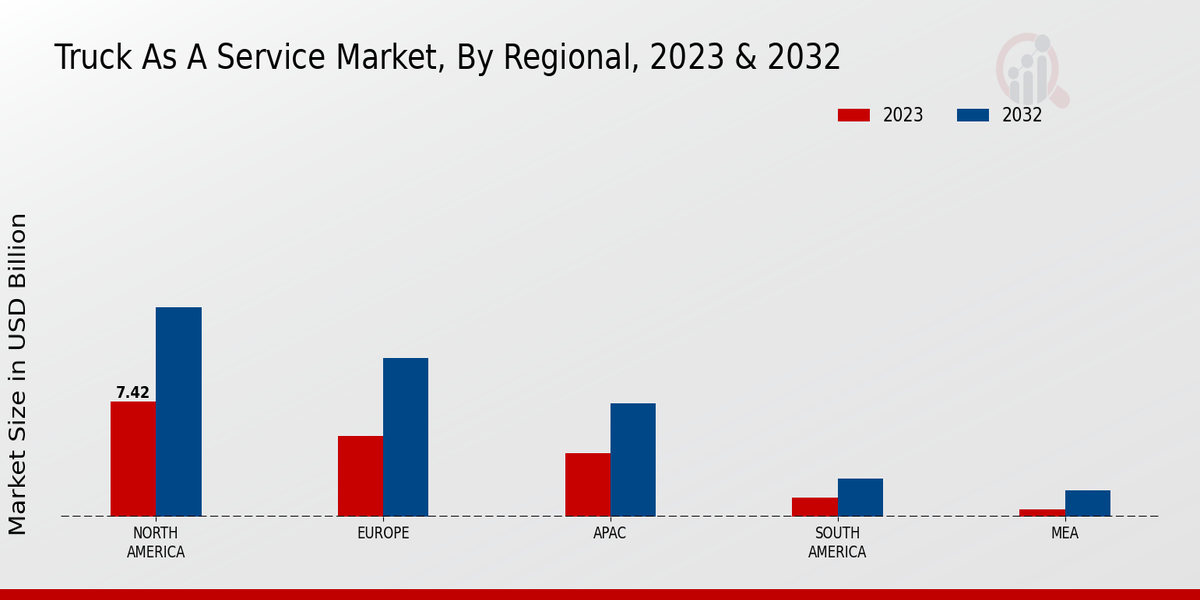Global Truck as a Service Market Overview
As per MRFR analysis, the Truck as a Service Market Size was estimated at 17.13 (USD Billion) in 2022.
The Truck as a Service Market is expected to grow from 18.41 (USD Billion) in 2023 to 35.2 (USD Billion) by 2032. The Truck as a Service Market CAGR (growth rate) is expected to be around 7.47% during the forecast period (2024 - 2032).
Key Truck as a Service Market Trends Highlighted
Numerous market forces are causing major changes in the global truck as a service sector, which is changing the logistics and transportation environment. Two major drivers driving this market ahead are the rising requirement for flexible and adaptable transportation solutions and the growing need for real-time cargo tracking.
Truck as a Service is becoming more and more popular as a result of businesses looking for more sustainable and effective transportation choices due to growing fuel prices and environmental concerns.
Businesses may now optimize routes, improve fleet management, and increase overall operational efficiency by integrating cutting-edge technology like telematics and the Internet of Things.
The sector has a lot of untapped potential, especially in the areas of electric and driverless vehicles. The need for electric trucks is rising gradually as companies try to lessen their carbon footprint.
Furthermore, the development of autonomous driving technology is likely to revolutionize the logistics sector, offering cost-saving possibilities and enhanced safety features.
Companies focused on innovation and the adaptation of their services to meet evolving consumer demands and regulatory requirements will find ample opportunities to thrive in this market. Recent times have seen trends toward more integrated and technology-driven solutions that cater to various customer needs.
This includes customized service offerings based on specific industries or regional demands. Growing partnerships between service providers and tech companies are becoming commonplace, making it easier to deliver tailored solutions that improve service quality.
As customer expectations rise and competitive pressure increases, businesses will need to leverage technology to stand out in the market.
These trends reflect a broader movement towards digitization and the need for agility in an ever-changing market environment. The ongoing evolution of the Truck as a Service Market indicates a transition towards a more interconnected and efficient transportation ecosystem.

Source: Primary Research, Secondary Research, Market Research Future Database and Analyst Review
Truck as a Service Market Drivers
Rising Demand for Flexible Logistics Solutions
The Truck as a Service Market is witnessing a significant uptick in demand for flexible logistics solutions and transportation services.
As businesses adapt to rapidly changing market conditions and consumer preferences, the need for scalable and efficient transportation solutions has never been greater. Companies are increasingly looking for ways to optimize their supply chains and reduce operational costs, making Truck as a Service (TaaS) an appealing option.
TaaS allows organizations to access commercial trucks and related services without the burden of ownership, providing them with the flexibility to adjust their fleet size according to their business needs. This trend is particularly strong among small to medium-sized enterprises (SMEs) that may not have the capital to invest in a fleet of vehicles but still require reliable transportation for their goods.
Moreover, the TaaS model supports a wide range of industries, including e-commerce, retail, and manufacturing, all of which are experiencing growth and require logistics solutions that can adapt to their evolving needs.
With an expected growth in market value, this driver is likely to continue driving innovation and competition in the Truck as a Service Market. Moreover, advancements in technology, including data analytics and IoT, are enabling TaaS providers to offer customized solutions that enhance operational efficiency.
By leveraging real-time data, these providers can optimize routes, improve load management, and reduce fuel consumption, further underscoring the importance of flexibility and efficiency in logistics.
Technological Advancements in Fleet Management
Technological advancements in fleet management systems are emerging as a crucial driver for the growth of the Truck as a Service Market. The integration of telematics, GPS tracking, and AI-driven analytics allows TaaS providers to manage their fleets more efficiently.
These technologies facilitate real-time monitoring of vehicle performance, driver behavior, and maintenance schedules, ultimately leading to improved safety and reduced operational costs.
Companies can expect higher service accuracy and minimize delays, which are critical in today's fast-paced logistics environment.
Sustainability and Environmental Regulations
The increasing emphasis on sustainability and compliance with environmental regulations significantly influences the Global Truck Service Market.
As governments worldwide implement stricter emissions standards and promote eco-friendly practices, companies are becoming more conscious of their environmental impact. TaaS providers are adapting by offering green transportation solutions, including electric trucks and eco-friendly logistics practices.
As organizations strive to enhance their corporate social responsibility, adopting Truck as a Service aligns with their sustainability goals.
Truck as a Service Market Segment Insights
Truck as a Service Market Service Type Insights
The Truck as a Service Market presented a comprehensive segmentation surrounding Service Type, encompassing essential services like Fleet Management, Vehicle Leasing, Fuel and Maintenance Services, and Telematics Services.
Fleet Management held a major position within this market, achieving a valuation of 6.9 USD Billion in 2023, and is projected to expand to 13.2 USD Billion by 2032, highlighting its critical role in optimizing operations and enhancing vehicle utilization for logistics companies.
Following this, Vehicle Leasing was a significant segment with a valuation of 4.5 USD Billion in 2023, forecasted to increase to 8.7 USD Billion by 2032.
This service aided companies in managing expenses while allowing flexibility in their fleet size, thus providing a means for businesses to scale operations without large capital outlays.
Fuel and Maintenance Services, valued at 3.7 USD Billion in 2023 and expected to reach 7.1 USD Billion in 2032, played a vital role in ensuring the operational efficiency of trucks while minimizing breakdowns, which was crucial for maintaining timely deliveries and reducing operational costs.
Also notable was Telematics Services, with a valuation of 3.31 USD Billion in 2023, projected to grow to 6.3 USD Billion by 2032; this segment emphasized real-time vehicle tracking and data analytics, driving better decision-making regarding route optimization and fleet performance.
The landscape of the Truck as a Service Market was characterized by increasing demand for efficient management of logistics and transportation, showcasing a growing trend toward digitization and sustainability. Each service type presents unique growth opportunities and addresses specific operational challenges faced by trucking firms, thus contributing to the overall growth trajectory of the market.
The strong performance of these segments suggested a shift in how companies perceive trucking services, operating beyond traditional ownership models to embrace innovative solutions that enhance operational effectiveness.
In this context, the Truck as a Service Market statistics reflected robust demand dynamics driven by the need for modernization and efficient resource management in the trucking industry.

Source: Primary Research, Secondary Research, Market Research Future Database and Analyst Review
Truck as a Service Market Vehicle Type Insights
The Truck as a Service Market is experiencing notable growth, particularly within the Vehicle Type segment, which includes Light Duty Trucks, Medium Duty Trucks, and Heavy Duty Trucks. Light Duty Trucks play a crucial role in urban logistics due to their versatility and ability to navigate congested areas, making them popular among delivery services.
Medium Duty Trucks are significant for applications in construction and distribution, bridging the gap between light and heavy units while addressing diverse hauling needs. Heavy Duty Trucks dominate the market with their capacity to transport substantial loads over long distances, serving industries like mining and long-haul freight.
The segmentation of the Truck as a Service Market reveals varied growth drivers, such as the rise of e-commerce and advancements in logistics management. However, the market also faces challenges, including regulatory compliance and the need for infrastructure development.
Despite these hurdles, opportunities abound in technological innovations and sustainable practices that can further enhance market dynamics.
Truck as a Service Market End Use Industry Insights
The market segmentation highlights a variety of end-use industries where trucks as a service are crucial, namely Logistics and Transportation, Construction, Retail, and Agriculture. Logistics and Transportation dominate the market, driven by the increasing demand for efficient supply chain solutions. Construction is also significant, as it requires timely delivery of materials to keep projects on schedule.
Retail has seen growing adoption of Truck as a Service solution due to the rise of e-commerce, necessitating flexible delivery options. Agriculture plays a pivotal role as well, with trucks needed for the transportation of goods from farms to markets to meet consumer demand.
Overall, the market reflects robust growth opportunities tied to advancements in technology and increasing investments in infrastructure, along with challenges such as fluctuating fuel costs and regulatory compliance that the industry must navigate. The Truck as a Service Market revenue continues to trend upward, showcasing its importance across various sectors.
Truck as a Service Market Technology Insights
The Truck as a Service Market is currently experiencing substantial growth. This segment focuses on technology-driven solutions that enhance trucking efficiency and sustainability. Within this segment, various approaches to powering trucks play a critical role.
Internal Combustion Engine technology remains a significant player, benefiting from established manufacturing practices and widespread use. However, Electric Trucks are gaining traction due to their eco-friendly nature, cost savings on fuel, and stricter emission regulations, appealing to a growing number of environmentally conscious consumers.
Hybrid Trucks offer a balanced approach, combining traditional fuel methods with electric power to optimize fuel efficiency and reduce emissions, catering to a diverse market that values versatility. The increasing demand for efficient logistics and sustainable transportation solutions is propelling market growth.
Challenges such as infrastructure for electric charging and the high initial investment for advanced truck technologies present hurdles, yet they also provide opportunities for innovation and development within the industry. As the market evolves, the shift toward greener technologies remains a driving force behind the Truck as a Service Market revenue expansion and its segmentation dynamics.
Truck as a Service Market Regional Insights
The Truck as a Service Market saw dynamic growth across its regional segments. In 2023, the North American segment held a majority share valued at 7.42 USD Billion and is expected to significantly increase to 13.5 USD Billion by 2032, driven by advanced logistics requirements and technology adoption.
Europe followed, with a valuation of 5.2 USD Billion in 2023 and projected growth to 10.2 USD Billion, reflecting a strong reliance on efficient transportation solutions. The APAC region, valued at 4.08 USD Billion in 2023, is anticipated to reach 7.3 USD Billion, highlighting the evolving infrastructure and rising demand for logistics in emerging markets.
Meanwhile, South America and MEA were smaller segments, valued at 1.23 USD Billion and 0.48 USD Billion in 2023, respectively, with expected growth to 2.5 USD Billion and 1.7 USD Billion. The challenges in these regions included infrastructure limitations and regulatory hurdles, yet the growing trend toward digitalization presents significant opportunities for the market.
Overall, the Truck as a Service Market revenue indicated a robust expansion across various regions, underlining the diverse opportunities in the logistics sector worldwide.

Source: Primary Research, Secondary Research, Market Research Future Database and Analyst Review
Truck as a Service Market Key Players and Competitive Insights
The Truck as a Service Market is experiencing significant growth driven by the increasing demand for logistics efficiency and cost-effectiveness across various industries. This market encompasses a range of services that integrate vehicle leasing, fleet management, driver support, and maintenance into a single package aimed at simplifying fleet operations for businesses.
As companies seek ways to enhance their operational capabilities without the burden of owning and maintaining fleets directly, the Truck as a Service model has gained traction. Competitive dynamics in this market are shaped by technological advancements, shifts in consumer behavior, and an accelerating push towards sustainability, positioning firms in a highly competitive environment where innovation and service quality are paramount.
Volvo has positioned itself as a strong player in the Truck as a Service Market, leveraging robust technology and a well-established brand reputation. The company's strengths lie in its comprehensive approach to service delivery, emphasizing reliability and efficiency.
With an extensive network of service centers, Volvo ensures that customers have access to timely support and maintenance, minimizing downtime. The integration of advanced telematics and data analytics in its trucks allows for enhanced fleet visibility and management, enabling businesses to make informed decisions that optimize operations.
Volvo's commitment to sustainability is also evident in its efforts to develop alternative fuel solutions and low-emission vehicles, aligning with global trends towards greener logistics practices. This holistic suite of offerings enhances Volvo's market presence and strengthens its competitive edge in the truck-as-a-service space.
Hino Motors operates as a significant competitor within the Truck as a Service Market, focusing on reliability and customer-centric solutions. Hino's strength lies in its ability to provide tailored services that cater to the specific needs of logistics providers and businesses.
With an emphasis on innovative technology and efficient fleet management systems, Hino enables customers to enhance their operational performance. The company's robust manufacturing capabilities, coupled with a deep understanding of regional markets, foster a strong connection with clients, allowing for customized service solutions that resonate well within the industry.
Hino Motors has also been proactive in incorporating environmentally friendly practices into its service offerings, thus appealing to a growing segment of customers who prioritize sustainability in their operational choices. Through these strategic initiatives, Hino continues to carve a reputable presence in the competitive landscape of the Truck as a Service Market.
Key Companies in the Truck as a Service Market Include
Truck as a Service Market Developments
Recent developments in the Truck as a Service Market have shown significant advancements across major players such as Volvo, Hino Motors, Sterling Trucks, and others. Companies are increasingly focusing on sustainability and integrating electric vehicles into their fleets. For instance, Tesla continues to lead the charge in electric trucking with their innovative models, while BYD is also expanding its electric truck offerings.
Partnerships and collaborations are on the rise, enhancing service capabilities and expanding market reach. Hino Motors has been actively working on expanding its hybrid truck technology, ensuring compliance with new environmental regulations.
Additionally, companies like Daimler and Mercedes-Benz are investing in digital technology to improve logistics and fleet management. In the realm of mergers and acquisitions, notable consolidations have occurred, particularly focusing on companies enhancing their technological competencies or expanding their market presence.
This is reflected in the valuation growth of companies such as PACCAR and Scania, which is influencing the competitive landscape. Increased investments in research and development are further solidifying the positioning of these companies within the market. Overall, the Truck as a Service Market is witnessing dynamic transformations driven by innovation and collaboration among key players.
| Report Attribute/Metric |
Details |
| Market Size 2022 |
17.13(USD Billion) |
| Market Size 2023 |
18.41(USD Billion) |
| Market Size 2032 |
35.2(USD Billion) |
| Compound Annual Growth Rate (CAGR) |
7.47% (2024 - 2032) |
| Report Coverage |
Revenue Forecast, Competitive Landscape, Growth Factors, and Trends |
| Base Year |
2023 |
| Market Forecast Period |
2024 - 2032 |
| Historical Data |
2019 - 2023 |
| Market Forecast Units |
USD Billion |
| Key Companies Profiled |
Volvo, Hino Motors, Sterling Trucks, Iveco, MAN Truck and Bus, Daimler, Navistar, Tesla, PACCAR, BYD, Isuzu, Freightliner, Scania, Renault Trucks, MercedesBenz |
| Segments Covered |
Service Type, Vehicle Type, End Use Industry, Technology, Regional |
| Key Market Opportunities |
Increased demand for efficient logistics, Growth in e-commerce shipping services, Adoption of sustainable transportation solutions, Expansion of smart fleet management technologies, Rising need for cost-effective freight solutions |
| Key Market Dynamics |
growing demand for logistics efficiency, increasing adoption of technology, sustainability and emission regulations, cost-effectiveness in transport solutions, the rise of e-commerce and online retail |
| Countries Covered |
North America, Europe, APAC, South America, MEA |
Frequently Asked Questions (FAQ):
The Truck as a Service Market is expected to be valued at 35.2 USD Billion by 2032.
The projected CAGR for the Truck as a Service Market from 2024 to 2032 is 7.47%.
North America is expected to hold the largest market share in the Truck as a Service Market, valued at 13.5 USD Billion in 2032.
Fleet Management services are projected to have a market value of 13.2 USD Billion in the Truck as a Service Market by 2032.
Major players in the Truck as a Service Market include Volvo, Daimler, Tesla, and PACCAR, among others.
Vehicle Leasing services are expected to be valued at 8.7 USD Billion in the Truck as a Service Market by 2032.
Telematics Services were valued at 3.31 USD Billion in the Global Truck Service Market in 2023.
Fuel and Maintenance Services are expected to reach a market size of 7.1 USD Billion by 2032.
Key trends driving growth in the Truck as a Service Market include increasing demand for fleet optimization and enhancement of operational efficiency.
The APAC region is expected to reach a market value of 7.3 USD Billion in the Truck as a Service Market by 2032.

















